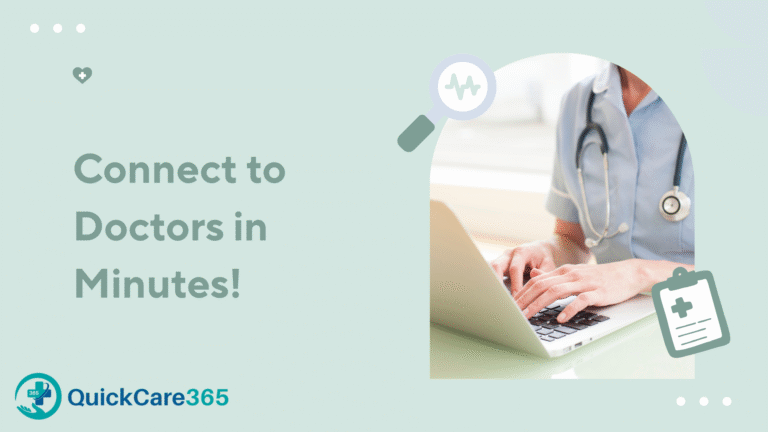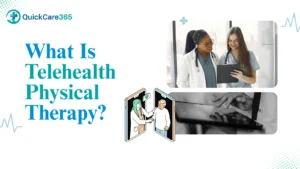If you’re in downtown Atlanta or rural Augusta, the world of healthcare is changing fast. Thanks to quickcare’s advances in technology and evolving regulations, telehealth in Georgia is bringing doctors, specialists, and care teams right into patients’ homes and making visits faster, safer and more flexible than ever.
From business wellness programs to employee healthcare portals, preparing for telehealth isn’t optional; it’s essential for staying competitive and connected. Let’s explore how Georgia is embracing telehealth, who’s benefitting, and what your next steps should be.
What Is Telehealth, And Why Georgia Is Embracing It
Simply put, telehealth in Georgia refers to using digital or remote communications (video, apps, or even phone) to deliver health care services, patient education, monitoring and more.
More than just a consultation over Zoom, telehealth covers:
- Virtual doctor visits or specialist consults
- Remote monitoring of chronic conditions
- Behavioural health via video or phone
- Patient education and self-management support
For providers and patients across the state, it means better access, less travel, fewer delays, and especially in underserved regions outside major metro areas, it’s a game-changer.
The 4 Types of Telehealth & What Businesses Should Know
When discussing telehealth in Georgia, it helps to break it down by modes, because what you adopt depends on your audience, infrastructure, and goals.
a. Live Video / Real-time visits
Patients and providers connect via video in real-time. Typical for primary care, follow-ups or behavioral health.
b. Store-and-forward (Asynchronous)
Recorded data (images, lab results, patient history) is sent ahead of time for provider review later.
c. Remote Patient Monitoring (RPM)
Devices track vitals or conditions like heart rate, glucose, and send data to providers for ongoing care.
d. Mobile Health (mHealth)
Health apps, texts, reminders and other tools support care outside traditional settings.
Knowing which type fits your service model is key when planning telehealth for employees, clients or patients in Georgia.
How Telehealth Works for Georgia Patients & Providers
For patients from Atlanta to Augusta, telehealth in Georgia means fewer trips, flexible hours, and easier access to specialists. For providers and businesses, it means new care-delivery models, extended reach and better efficiency.
Benefits include:
- Immediate access to specialists without long travel
- Reduced no-shows and better scheduling flexibility
- Improved patient engagement and follow-up compliance
- Expanded service coverage into rural and underserved regions
Telehealth also helps businesses (employers, clinics, wellness platforms) deliver care across multiple locations or workforce groups, making it especially useful in Georgia’s diverse urban-rural mix.
Key Regulatory & Coverage Rules in Georgia
Understanding the regulatory framework is critical when offering or using telehealth in Georgia. Here are some important highlights:
- Georgia law defines telemedicine as clinical services delivered via real-time two-way communications by a Georgia-licensed provider.
- Insurers in Georgia must reimburse telemedicine services on at least the same basis as in-person services (payment parity).
- Providers must hold appropriate Georgia licensure and follow standards of care comparable to in-person visits.
- For out-of-state providers wishing to serve Georgia patients via telehealth, special telemedicine licensing and credentialing requirements apply.
For any business or healthcare facility offering or using telehealth platforms in Georgia, compliance with these rules isn’t optional; it’s necessary.
Ready to bring modern care to your employees or clients? Partner with Quick Care 365 for seamless telehealth in Georgia solutions, secure, compliant and built for business. Schedule a Consultation
How Businesses from Atlanta to Augusta Are Using Telehealth
From large employers in Atlanta to rural clinics near Augusta, companies and health systems are using telehealth in Georgia to:
- Provide wellness checks for remote workers
- Deliver behavioral health support across multiple sites
- Monitor chronic conditions with RPM devices
- Offer multi-lingual support and on-demand telemedicine for workforce populations
The bottom line: telehealth isn’t just “nice to have”, it’s becoming a core part of how health services are delivered at scale across Georgia.
Choosing the Right Telehealth Partner for Your Organization
When you’re ready to implement telehealth, picking the right partner is key:
- Ensure the vendor is familiar with Georgia licensure and reimbursement rules.
- Look for platforms that integrate clinic workflows and employee programs.
- Confirm technology is secure, HIPAA compliant, and user-friendly.
- Ask for data analytics and outcome tracking to measure ROI.
With the right setup, your business can deliver high-quality care that is convenient, compliant and cost-effective.
Don’t wait for patient demand or competitive pressure to force change. Leverage telehealth in Georgia now to scale care, improve access, and reduce costs. Book a Demo with Quick Care 365
Conclusion
From Atlanta’s metro hospitals to Augusta’s community clinics, telehealth in Georgia is reshaping how care is delivered, accessed, and experienced. For businesses, providers and patients alike, the advantages are clear: convenience, reach, and better outcomes.
As you evaluate your next steps, remember that success comes from more than just technology; it comes from compliance, quality, and thoughtful implementation. With the right partner, that’s exactly what you’ll get.
Visit QuickCare365.com to learn more about our telehealth services tailored for Georgia.
Common FAQs: Telehealth in Georgia
Q1. What are the four types of telehealth?
Live video, store-and-forward, remote patient monitoring (RPM), and mobile health (mHealth) are all standard types.
Q2. What are the five basic requirements for telemedicine?
In Georgia, key requirements include: licensed provider, standard of care equal to in-person, secure technology, patient consent and record keeping.
Q3. Can I have a telehealth appointment out of state?
Only if the provider is properly licensed in Georgia (or holds a Georgia telemedicine license) and complies with Georgia rules.
Q4. What about Georgia telehealth out-of-state?
Providers outside Georgia must meet credentialing or licensing requirements to deliver services to Georgia patients. Without that, the visit may not be compliant.








